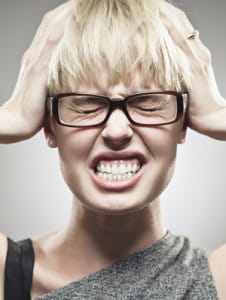
How to Tell
The primary indication of bruxism is a headache. However, there are many other symptoms can arise such as a sore jaw, muscle aches, ear aches, and tightness in the shoulders. While these larger symptoms may have you pinning your guesses on other causes, you should also pay attention to your teeth. The Bruxism Association states that those with bruxism may show signs of the condition based on abnormal tooth wear, fracturing of teeth, inflammation and gum recession, and loss of teeth prematurely.
What Causes it?
The causes of bruxism vary, but can come from lifestyle choices, psychological issues, and sleep disorders. Some people with bruxism also smoke, use caffeine, or use alcohol heavily, which serve as co-factors. However, nearly 70% of cases are caused by stress and anxiety. Stress associated with a job has been a higher indicator of bruxism, as it affects sleep as well. Those with sleep disorders also have a high instance of bruxism. People with obstructive sleep apnea and 
How to Deal
If this sounds like something you might have, there are some helpful solutions! The causes whether lifestyle choices, sleep disorders, or psychological issues will determine what kind of treatment will best suit you. You should visit Shoreline Dental Studio for a comprehensive exam to customize a treatment plan to alleviate your bruxism symptoms.
In order to protect your teeth, an occlusal appliance worn at night can cut down damage on your teeth. These can include splints, bite guards, night guards, and bite plates which are molded to your teeth that can also reduce muscle pain associated with bruxism. However, those with sleeping disorders are often shown to use Mandibular Advancement Devices (MADs), which help alleviate snoring and sleep apnea, and also cut down on bruxism symptoms.
If you suspect you grind your teeth, visit us at Shoreline Dental Studio for a comprehensive treatment plan.
